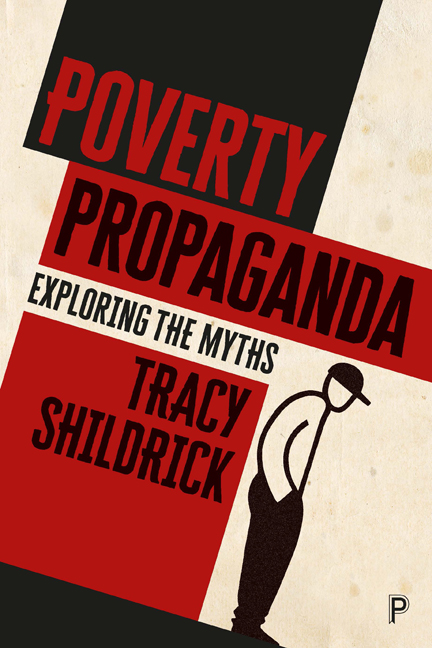Book contents
- Frontmatter
- Contents
- List of abbreviations
- Acknowledgements
- One Introduction
- Two Poverty propaganda
- Three Poverty and lived experiences
- Four Poverty, labour markets and ‘poor work’
- Five Poverty, social class and social immobility
- six Poverty: discrimination, stigma and shame
- Seven Poverty propaganda and reproduction of poverty, power and inequality
- Eight Conclusions
- References
- Index
Two - Poverty propaganda
Published online by Cambridge University Press: 09 April 2022
- Frontmatter
- Contents
- List of abbreviations
- Acknowledgements
- One Introduction
- Two Poverty propaganda
- Three Poverty and lived experiences
- Four Poverty, labour markets and ‘poor work’
- Five Poverty, social class and social immobility
- six Poverty: discrimination, stigma and shame
- Seven Poverty propaganda and reproduction of poverty, power and inequality
- Eight Conclusions
- References
- Index
Summary
Introduction
Family with eight children who receive £40,000-a-year in benefits demand their council given them a NINEbedroom house. (Daily Mail, 20 August 2015)
Ban state hand outs from being spent on booze says Yorkshire MP. (ITV News, 18 December 2012)
Benefit reforms will end the ‘something for nothing’ society. (Iain Duncan Smith, 2013)
The Daily Mail article quoted above prompted 1,137 comments, of which the following was not untypical: ‘I would give them a house if I had my way … A WORK HOUSE … that's all this country needs to motivate this type of parasitic trash’, from someone calling themselves ‘Proud subject’ from Sunderland (Daily Mail, 2015a). The article – and the response – is fairly typical of the sentiments that can arise largely as a consequence of what I describe as poverty propaganda: narratives about poverty and people who are disadvantaged in various ways that deliberately misrepresent both the causes and the consequences of poverty in contemporary Britain. Discussions of poverty in Britain, whether in the popular or the political arena, tend to revolve around a Pandora's box of ideas that coalesce around the notion that those experiencing poverty are somehow undeserving, and culpable for their own predicament. Such is the power and influence of poverty propaganda in the current context that many people – even those experiencing deep poverty themselves – tend to distance themselves from the condition and the maligned and stigmatised populations that are so readily associated with it. The idea that segments of the population experience poverty because of their own failings is nothing new, but poverty propaganda is so powerful and pervasive in the current context that all poverty and related disadvantages are generally believed to be deserved in one way or another (Tyler, 2013). Social and political changes since the mid-1970s have created a fertile environment in which poverty propaganda is able to flourish. In particular, general rising standards of living, accompanied by the increasing importance of consumption as a marker of inequality, and the shifts associated with the individualisation of responsibility all pave the way for poverty propaganda to thrive.
Part of the power of poverty propaganda is its elasticity and Malleability.
- Type
- Chapter
- Information
- Poverty PropagandaExploring the Myths, pp. 21 - 42Publisher: Bristol University PressPrint publication year: 2018



